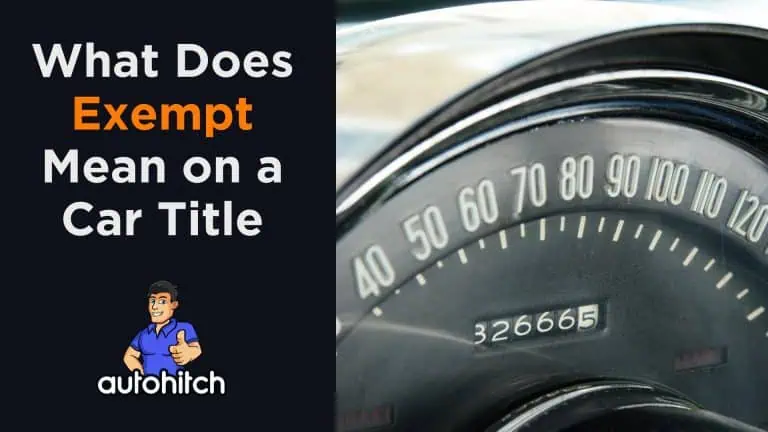If you come across the term “exempt” on a car’s title, it means that the vehicle is exempt from the federal odometer disclosure requirements.
What This Means for You When Buying or Selling a Used Car
Being exempt from odometer disclosure means that when a vehicle is sold or transferred, the seller is not legally required to disclose the vehicle’s mileage to the buyer. This exemption typically applies under certain conditions, such as the vehicle’s age.
Here’s how it affects both buyers and sellers in more detail:
For Car Sellers:
- No Requirement for Mileage Disclosure: Sellers of vehicles that qualify as exempt are not required to provide the actual mileage on the title transfer paperwork. This simplifies the process of selling older vehicles where the odometer reading may no longer accurately reflect the vehicle’s total mileage due to limitations of the odometer (e.g., odometers that only go up to 99,999 miles and then roll over to 0).
- Responsibility for Accuracy: While exempt sellers are not required to disclose mileage, if they choose to provide a mileage figure, they are not absolved of responsibility for deliberately providing false information. Misrepresenting a vehicle in other aspects still carries legal consequences.
For Car Buyers:
- Unknown or Unverified Mileage: When purchasing an exempt vehicle, buyers should be aware that the mileage on the vehicle is unknown or unverified. This can affect their understanding of the vehicle’s condition, as higher mileage often correlates with more wear and tear.
- Due Diligence: Buyers of exempt vehicles should take additional steps to assess the vehicle’s condition. This may include getting a vehicle history report, having the vehicle inspected by a trusted mechanic, and considering the vehicle’s age and overall appearance as indicators of its condition.
- Impact on Value and Decision: The lack of a verified odometer reading might affect a buyer’s decision-making process. Some buyers might be more cautious, considering the potential for unknown mechanical issues due to unverified mileage. This uncertainty can also impact the vehicle’s perceived value.
General Effects of Odometer Disclosure Exemption
| For Sellers | For Buyers |
|---|---|
| Simplifies sale of older vehicles. | Buyers face unknowns regarding vehicle mileage and condition. |
| Encourages honesty about vehicle condition, despite exemption. | Encourages thorough vehicle evaluation and possibly negotiation based on the condition rather than mileage. |
Table of Contents
Other Relevant Articles to Read:
- Vin Cloning Scam
- Possible Red Flags or Signs of a Scam When Buying a Car
- How To Sell A Car Without Getting Scammed
New Odometer Disclosure Laws
Historically, vehicles over 10 years old were considered exempt. However, this exemption rule has recently changed, as I will explain below.
The NHTSA has updated the federal odometer disclosure requirements. Starting from January 1, 2021, the odometer disclosure laws are as follows:
Current Odometer Disclosure Requirements
| Model Year | Disclosure Requirement | Duration | Notes |
|---|---|---|---|
| 2011 and Newer | Required for every transfer of ownership | First 20 years | To combat odometer fraud; compliance with Federal law necessary |
| 2010 and Older | Subject to previous 10-year disclosure requirements | Exempt after 10 years | Continue under the old requirements; exempt from the new rule |
- For Model Year 2011 or newer vehicles: Odometer disclosures are mandatory for every transfer of ownership within the first 20 years. For instance, sellers of Model Year 2011 vehicles must disclose odometer readings until the year 2031.
- For Model Year 2010 and older vehicles: These vehicles are exempt from the extended Federal odometer disclosure requirements and will continue to follow the previous 10-year disclosure rule.
This change aims to address the rise in odometer fraud involving older vehicles by requiring more comprehensive odometer disclosures for a longer period.
Other Relevant Information on Odometer Laws
- Odometer tampering is a federal offense, punishable by fines and potential imprisonment. Consumers who believe they have been victims of odometer fraud can seek legal recourse.
- In addition to the federal odometer disclosure law, some states have their own laws and regulations regarding odometer disclosures and exemptions. It’s essential to check your state’s specific requirements.
- Vehicles with a Gross Vehicle Weight Rating (GVWR) over 16,000 pounds, as well as vehicles like snowmobiles and all-terrain vehicles, are generally exempt from odometer disclosure requirements, regardless of their age.
- When purchasing a used vehicle, it’s always advisable to have it inspected by a trusted mechanic, who can assess the vehicle’s condition and potentially identify any signs of odometer tampering or discrepancies.
Key Points For this Article
- Applies to Model Year 2010 and Older Vehicles: These vehicles are “exempt” after 10 years, in line with previous regulations.
- Applies to Model Year 2011 and Newer Vehicles: Must disclose odometer readings for the first 20 years, after which they can be marked “exempt”.
- Reflects Updated Federal Guidelines: Changes aim to combat odometer fraud in older vehicles.
- Legal Ownership Transfer: The “exempt” status allows for the legal transfer of ownership without a recent odometer reading, respecting the new 20-year rule for newer models.



